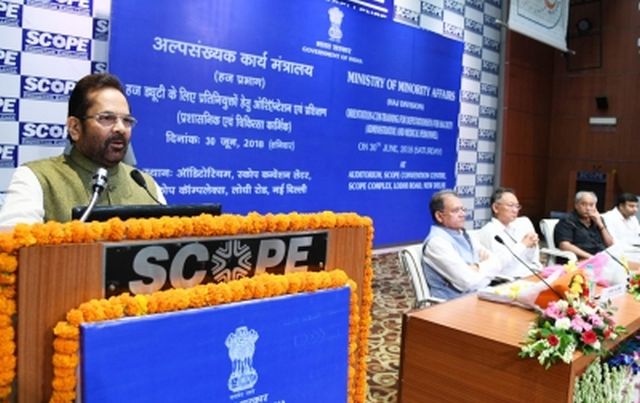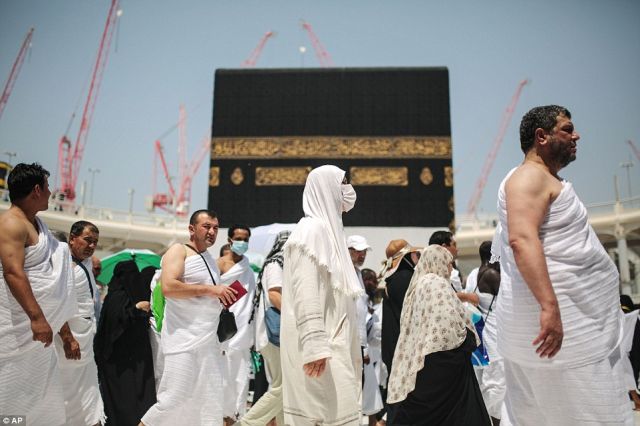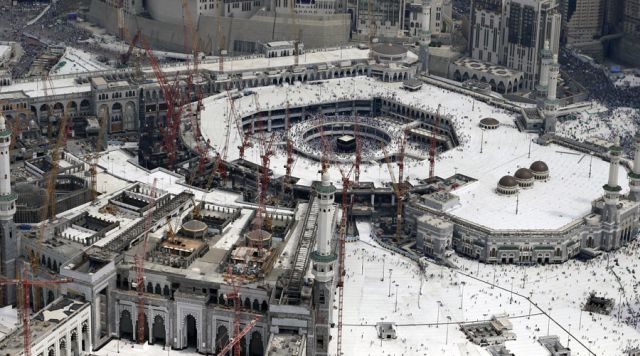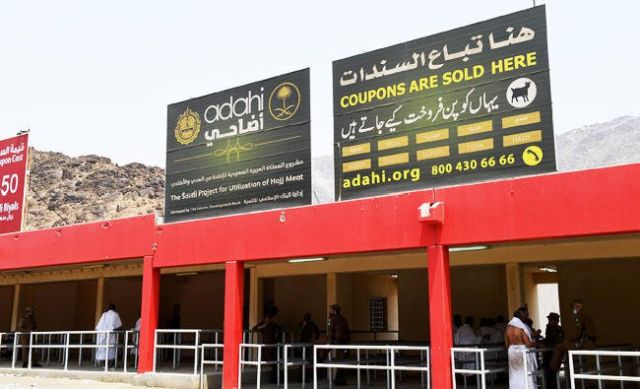
by Editor | May 25, 2021 | News, Politics
 New Delhi : The year 2018 that began with the end of Haj subsidy has been marked by a record 175,025 Indians heading for Saudi Arabia and is also distinct for a record 47 per cent women among the pilgrims including 1,308 without their ‘mehram’ (male companion).
New Delhi : The year 2018 that began with the end of Haj subsidy has been marked by a record 175,025 Indians heading for Saudi Arabia and is also distinct for a record 47 per cent women among the pilgrims including 1,308 without their ‘mehram’ (male companion).
“For the first time after the Independence, record 1,75,025 Muslims from India are going to Haj this year. These include record more than 47 per cent female pilgrims,” Minority Affairs Minister Mukhtar Abbas Naqvi said addressing an orientation cum training camp here.
Despite removal of Haj subsidy and various new taxes imposed in Saudi Arabia, a lot of Muslims from India are going to Haj this year that too without any additional financial burden, he said. In fact, the airlines will be getting Rs 57 crore less this year from the passengers.
“Even after ending the Haj subsidy, airlines will be paid Rs 57 crore less … Last year Rs 1,030 crore was paid to airlines as air fare for 1,24,852 Haj pilgrims and this year Rs 973 crore will be paid for 1,28,702 Haj pilgrims going through Haj Committee of India,” Naqvi said.
For the first time, choice of embarkation points has been given to Haj pilgrims which has received overwhelming response. The minister said a total of 3,55,604 applications was received for Haj 2018 which included 1,89,217 male and 1,66,387 female applicants.
“For the first time a total of 1,308 women Muslim women from India are going to Haj without ‘mehram’,” he told the Haj Coordinators, Assistant Haj Officers, Haj Assistants and medical personnel including 98 women staff who are deployed to assist the pilgrims.
Representatives from Minority Affairs Ministry, Health Ministry and Urban Development Ministry informed in detail, various issues concerned to Haj, pilgrims, their health, safety and accommodation during the camp, the ministry said in a statement.
Flights for Haj will start from July 14, when pilgrims from Delhi, Gaya, Guwahati, Lucknow and Srinagar will embark on pilgrimage. On July 17 pilgrims from Kolkata, July 20 from Varanasi, July 21 from Mangalore, July 26 from Goa and on July 29 pilgrims from Aurangabad, Chennai, Mumbai and Nagpur will embark on Haj, he added.
Pilgrims from Ranchi will leave for Haj on July 30, from Ahmedabad, Bangalore, Cochin, Hyderabad and Jaipur on August 1, and from Bhopal on August 3.
—IANS

by Editor | May 25, 2021 | Muslim World
 Jakarta : The Saudi Arabian authorities have allowed Indonesia`s customs to check Hajj pilgrims` identity by using biometrics in home country`s embarkation, according to Indonesian Minister of Religious Affairs Lukman Hakim Saifuddin.
Jakarta : The Saudi Arabian authorities have allowed Indonesia`s customs to check Hajj pilgrims` identity by using biometrics in home country`s embarkation, according to Indonesian Minister of Religious Affairs Lukman Hakim Saifuddin.
Saifuddin believes that the arrangement will cut queues during security check-in Saudi Arabia. “All this time, our Hajj pilgrims should wait for hours to queue, both in Jeddah or Madinah airport, now it can be checked in our Hajj embarkation,” he said here on Saturday.
The Minister was thankful for Indonesian government`s effort in convincing Saudi`s customs to permit such policy to improve security system`s efficiency.
By using biometrics in the Hajj dormitory, the Indonesian customs will verify each pilgrim`s fingerprints and iris scans, as well as travel documents. Hence, they just need to queue for passport stamp upon arrival in Saudi Arabia.
Besides cutting queues, Saifuddin said such system will allow Indonesian Hajj pilgrims to have more time to rest after a long hour flight.
In near future, the biometrics system will be fully regulated in 18 Hajj embarkation points in Indonesia.
—AG/UNA-OIC

by Editor | May 25, 2021 | Muslim World
 By Viola Fahmy,
By Viola Fahmy,
Cairo: Riyadh’s ambassador to the Arab League, Ahmed Qattan, has reiterated his country’s rejection of the “politicization” or “internationalization” of the annual Hajj pilgrimage to Saudi Arabia.
“Attempts to internationalize the Holy Places of Mecca and Medina are part of a wider conspiracy,” Qattan, who also serves as Saudi ambassador to Egypt, tweeted Tuesday.
“These attempts show that certain countries are following the lead of Iran, which has tried in the past to promote these contemptable ideas,” he added, in a veiled reference to Qatar.
Qattan went on to assert that the “politicization and/or internationalization” of Saudi Arabia’s holy sites was a “red line” that was tantamount to “political suicide”.
In recent years, Iran has floated the notion of establishing an “international administration” to manage the annual Muslim Hajj pilgrimage — an idea Saudi Arabia vociferously rejects.
Saudi Arabia severed its relations with Iran in early 2016 after Iranian demonstrators ransacked two Saudi diplomatic missions in Tehran and Mashhad.
Last summer, Saudi Arabia and three Arab states — Egypt, the United Arab Emirates and Bahrain — collectively severed ties with Qatar, accusing Doha of supporting terrorism and standing too close to Iran.
Qatar, for its part, dismisses the allegations, saying that attempts to isolate it by its fellow Gulf States constitute a violation of international law.
—AA

by Editor | May 25, 2021 | Investing, Muslim World
 Riyadh : Saudi Arabia on Monday announced a plan to launch a company to increase the capacity of the Grand Mosque in Mecca to accommodate pilgrims who are expected to reach more than 30 million by 2030.
Riyadh : Saudi Arabia on Monday announced a plan to launch a company to increase the capacity of the Grand Mosque in Mecca to accommodate pilgrims who are expected to reach more than 30 million by 2030.
The company’s establishment is in line with Vision 2030, which aims to provide an opportunity for the largest possible number of Muslims to perform Haj and Umrah and to enrich their experience through the development of the Grand Mosque.
The Public Investment Fund announced in a statement on Saudi Press Agency the launch of Rou’a Al Haram company to develop areas around the holy sites of Mecca and raise the quality of services in the local hospitality sector.
The projects will create around 160,000 job opportunities by 2030, with an estimated annual contribution to GDP of $2.1 billion, Xinhua news agency reported.
The first phase of the company’s projects will cover an area of 854,000 square metres, delivering 115 buildings of various architectural designs.
Altogether 70,000 new hotel rooms will enable the site to receive 310,000 visitors per day. Also, the first phase will see the development of around 9,000 residential units, 360,000 square metres of commercial space and prayer areas designated for more than 400,000 worshipers.
The project will be only less than 1.5 km away from the Kaaba, the most sacred site in Islam.
Rou’a Al Haram will raise the level of development in the areas surrounding the Grand Mosque, making it among the best examples of development worldwide, the report said.
Also, it will support job creation and investment as part of a wider plan to diversify the national economy.
Initial preparation works were underway, with construction due to start in 2018. The first phase of the project is anticipated to launch in 2024.
—IANS

by Editor | May 25, 2021 | Halal Food, Halal Industries, Muslim World
 Makkah : The Utilization of Sacrificial Meat (Adahi) is a project undertaken by Saudi Arabia in collaboration with the Islamic Development Bank (IDB) that aims to distribute sacrificial meat among over 30 million people in 27 countries in the Asian and African continents.
Makkah : The Utilization of Sacrificial Meat (Adahi) is a project undertaken by Saudi Arabia in collaboration with the Islamic Development Bank (IDB) that aims to distribute sacrificial meat among over 30 million people in 27 countries in the Asian and African continents.
In the past Hajj seasons, people used to freeze and ship the excess meat from lamb sacrifices to their countries. The abundance of meat during Hajj became a problem over the years. Pilgrims could not eat all the sacrificed meat and it was left on the streets, causing a sanitation crisis, bad smells and disease. The authorities then would bury the meat.
Saudi scholar Saeed Al-Amoudi told Al-Hayat that the increase of pollution caused by the lamb sacrifices led the Kingdom to take the first initiative in 1983 to avoid such waste and to help the poor. The Kingdom assigned the IDB to manage the project along with the Saudi authorities.
In 2000, the Adahi project was developed, with over 40,000 employees working in different fields such as management, supervision, slaughtering, shipping and distribution.
Every year, 30,000 heads of sheep, cows and camels are slaughtered to be distributed to 30 million poor people and refugees in 27 countries in Asia and Africa.
A center for treating the excess meat was also established. The center is capable of processing 500 tons of waste per day and turning it into natural fertilizers, separated from the extracted fat that can be used in factories. Thus, the center is able to get rid of the excess meat in an eight-day period following the Hajj.
This unique project emphasizes the creative ideology of turning problems into innovative solutions, and stresses the efforts of the Kingdom to provide a better life for the less fortunate.
—AG/IINA

 New Delhi : The year 2018 that began with the end of Haj subsidy has been marked by a record 175,025 Indians heading for Saudi Arabia and is also distinct for a record 47 per cent women among the pilgrims including 1,308 without their ‘mehram’ (male companion).
New Delhi : The year 2018 that began with the end of Haj subsidy has been marked by a record 175,025 Indians heading for Saudi Arabia and is also distinct for a record 47 per cent women among the pilgrims including 1,308 without their ‘mehram’ (male companion).



